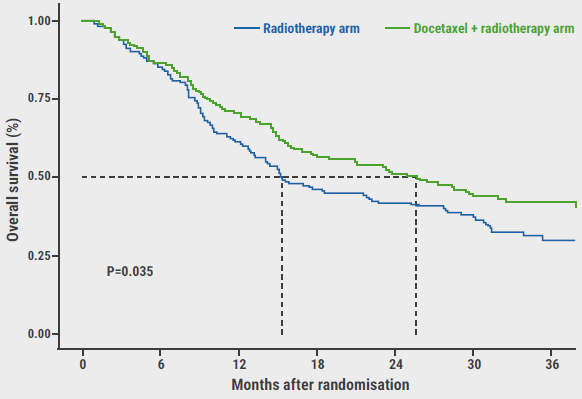https://doi.org/10.55788/0ae7ff55
The phase 2 SABR-COMET trial (NCT01446744) displayed a clinical benefit of SART for patients with oligometastatic cancers [1]. “In oligometastatic breast cancer, phase 3 data for the efficacy of metastasis-directed therapy is lacking,” mentioned Dr Steven Chmura (University of Chicago, IL, USA). The phase 2R stage of the phase 2R/3 NRG-BR002 trial (NCT02364557) randomised 128 patients with oligometastatic breast cancer 1:1 to first-line, standard-of-care systemic therapy with or without additional metastasis-directed therapy (surgical resection or SART) [2]. Previously, the phase 1 NRG-BR001 trial demonstrated the absence of dose-limiting toxicities for the use of SART in patients with multiple metastasis [3]. Progression-free survival (PFS) was the primary endpoint of the current study.
In total, 93% of the patients in the experimental arm received SART and only 2% received surgery. After a median follow-up of 35 months, no significant difference was measured in PFS between the 2 treatment arms (HR 0.92, P=0.36). The 36-month PFS rates were 32.8% in the control arm and 38.1% in the experimental arm, which were not sufficient enough to continue with the phase 3 part of the trial.
Both treatment arms were well tolerated and showed similar safety profiles. In the control arm, 10% of the patients had a grade 3 adverse event, whereas 5% of the patients in the experimental arm experienced a grade 3 adverse event. Only 1 grade 4 adverse event was reported, which occurred in the control arm. Finally, exploratory data showed that patients with >1 metastasis may benefit more from additional metastatic-directed therapy, whereas those with 1 metastasis may be better off with the standard-of-care alone.
“High dose SART was safe in patients with oligometastatic breast cancer, but this metastasis-directed therapy failed to provide a significant PFS benefit for these patients,” concluded Dr Chmura.
- Palma DA, et al. J Clin Oncol. 2020;38:2830‒2838.
- Chmura SJ, et al. NRG-BR002: A phase IIR/III trial of standard of care systemic therapy with or without stereotactic body radiotherapy (SBRT) and/or surgical resection (SR) for newly oligometastatic breast cancer (NCT02364557). Abstract 1007, ASCO 2022 Annual Meeting, 3‒7 June, Chicago, IL, USA.
- Chmura S, et al. J Clin Oncol. 2021; 7(6):845‒852.
Copyright ©2022 Medicom Medical Publishers
Posted on
Previous Article
« Analysis by residual cancer burden further clarifies effect of pembrolizumab Next Article
SET2,3 to inform on chemotherapy decisions in ER-positive breast cancer »
« Analysis by residual cancer burden further clarifies effect of pembrolizumab Next Article
SET2,3 to inform on chemotherapy decisions in ER-positive breast cancer »
Table of Contents: ASCO 2022
Featured articles
Breast Cancer
Sacituzumab govitecan meets primary endpoint
Shaky OS results of palbociclib in ER-positive/HER2-negative breast cancer
Practice-changing results of T-DXd in HER2-low breast cancer
SET2,3 to inform on chemotherapy decisions in ER-positive breast cancer
Metastasis-directed therapy fails in oligometastatic breast cancer
Analysis by residual cancer burden further clarifies effect of pembrolizumab
Contribution of metastatic therapies on mortality reduction in breast cancer
Radiotherapy may be omitted in breast cancer patients
Promising data for ribociclib after progression on ET plus CDK4/6 inhibitors in HR-positive/HER2-negative metastatic breast cancer
7-gene biosignature: Benefits of endocrine therapy and radiotherapy in breast cancer risk groups
Lung Cancer
Additional tiragolumab does not help patients with untreated small cell lung cancer
Success for serplulimab plus chemotherapy in small cell lung cancer
Adagrasib safe and clinically active in non-small cell lung cancer
Long-term benefits of combined immunotherapy over chemotherapy in non-small cell lung cancer
Effect of KRAS mutations and PD-L1 expression on therapy response in non-small cell lung cancer
Melanoma
First results on distant metastasis-free survival in stage II melanoma
Higher response rates for concurrent triple therapy versus sequential therapy in melanoma
Genitourinary Cancers
Exploratory treatment options fail in ccRCC
Adjuvant everolimus did not benefit high-risk renal cell carcinoma
Cabozantinib fails as first-line maintenance therapy in urothelial cancer
177Lu-PSMA-617 is a valid treatment option for PSMA-positive mCRPC
Enzalutamide performs well in metastatic hormone-sensitive prostate cancer
Haematologic Malignancies
Autologous stem cell transplantation plus RVd improves PFS in multiple myeloma
Novel first-line treatment option for mantle cell lymphoma
Promising results for novel CAR-T therapy in relapsed/refractory multiple myeloma
Gastrointestinal Cancers
Panitumumab beats bevacizumab in RAS wildtype left-sided metastatic colorectal cancer
Spectacular results for dostarlimab in mismatch repair deficient rectal cancer
Triplet chemotherapy beats doublet chemotherapy in colorectal cancer liver metastases
To resect or not to resect primary tumours in stage IV colon cancer?
Novel treatment option for KRAS wildtype pancreatic cancer
Gynaecological Cancers
Primary results of rucaparib in ovarian cancer
Trabectedin not superior to chemotherapy in recurrent epithelial ovarian cancer
Encouraging results of relacorilant in ovarian cancer
Miscellaneous Topics
Bacterial decolonisation effective against radiation dermatitis
New standard-of-care for cisplatin-ineligible locally advanced head and neck squamous cell carcinoma
Ifosfamide is likely to be the go-to therapy in recurrent Ewing sarcoma
Dabrafenib plus trametinib candidates for standard-of-care in BRAF V600-mutated paediatric low-grade glioma
Related Articles
August 5, 2022
Sacituzumab govitecan meets primary endpoint
August 5, 2022
Novel treatment option for KRAS wildtype pancreatic cancer

© 2024 Medicom Medical Publishers. All rights reserved. Terms and Conditions | Privacy Policy
HEAD OFFICE
Laarderhoogtweg 25
1101 EB Amsterdam
The Netherlands
T: +31 85 4012 560
E: publishers@medicom-publishers.com

